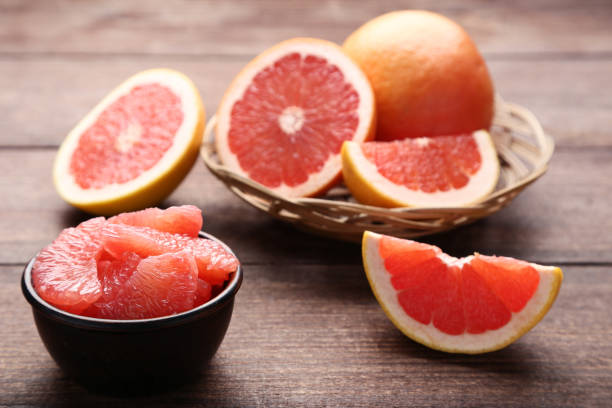Grapefruit contains compounds that may interfere with how your body absorbs some drugs, including some blood pressure medicines. It can leave too much or too little of the drug in your bloodstream, which may be dangerous. Always ask your doctor or pharmacist if grapefruit could affect the medicine you're taking.
What to Know if You Drink Grapefruit Juice and Take Blood Pressure Drugs

This can usually be accomplished with a combination of lifestyle changes — including weight loss, regular exercise and eating a low-salt diet — plus one or more medications that may include a type called calcium channel blockers, the AHA explains.
Grapefruit and Channel Blockers
Calcium causes the heart and arteries to contract with more power, but blocking it allows blood vessels to relax and widen, reducing blood pressure levels. That's where calcium channel blockers come in. These drugs prevent calcium from entering the cells of your heart and arteries, according to the Mayo Clinic.
These drugs are also used to treat certain kinds of irregular heartbeats and crushing chest pain known as angina. Examples of calcium channel blockers include amlodipine (Norvasc), diltiazem (Cardizem, Tiazac), felodipine (Plendil), isradipine, nicardipine (Cardene), nifedipine (Adalat CC, Procardia), nisoldipine (Sular) and verapamil (Calan, Verelan).
However, the problem with grapefruit and grapefruit juice is that they can increase the amount of calcium channel blockers in your bloodstream, which in turn raises your risk for side effects, explains NYU Langone cardiologist Nieca Goldberg, MD, medical director of the Joan H. Tisch Center for Women's Health in New York City.
Effect of Grape Fruit
In essence, she says, "grapefruit and grapefruit juice may increase the effectiveness of calcium channel blockers, which is dangerous because your blood pressure may go too low."
The Mayo Clinic adds that grapefruit juice can interact with calcium channel blockers and affect your heart rate and blood pressure, causing symptoms such as headaches and dizziness.
Here's why: Many drugs, including your calcium channel blockers, are broken down with help from an enzyme called CYP3A4 in the small intestine. Grapefruit and grapefruit juice can block the action of this enzyme, says the FDA. When this happens, more of the drug enters your blood and stays there longer, instead of being excreted, the FDA explains.
Grapefruit and grapefruit juice can also have the opposite effect on some drugs and decrease their effectiveness, the FDA adds.
In fact, exactly how big of an effect the grapefruit or grapefruit juice might have on your medication isn't a precise science. It depends on several factors, including the specific drug, the dose and the amount you consume, the FDA points out. However, as the Mayo Clinic advises, it's best to talk with your doctor about the specific risk you face if you're taking calcium channel blockers.
Other Drug and Grapefruit Interactions
Blood pressure-lowering medications are not the only drugs that can be affected by grapefruit and grapefruit juice, Dr. Goldberg says. The list also includes cholesterol-lowering statins, immunosuppressants that prevent rejection of transplanted organs, steroids, antibiotics, drugs that treat abnormal heart rhythms, antihistamines for allergies, birth control pills and antibiotics, she says.
These interactions are enough of a concern that it's important to discuss with your doctor about how much grapefruit or grapefruit juice you consume whenever you start a new prescription, Dr. Goldberg says. Also, always read the labels of all over-the-counter drugs you take, she says, or ask your pharmacist about possible interactions.
"If you are someone who drinks grapefruit juice and are on a drug that may interfere with it, reduce how much you drink," she says. "If you are on a high dose of a calcium channel blocker, it may be best to avoid grapefruit and grapefruit juice altogether."






